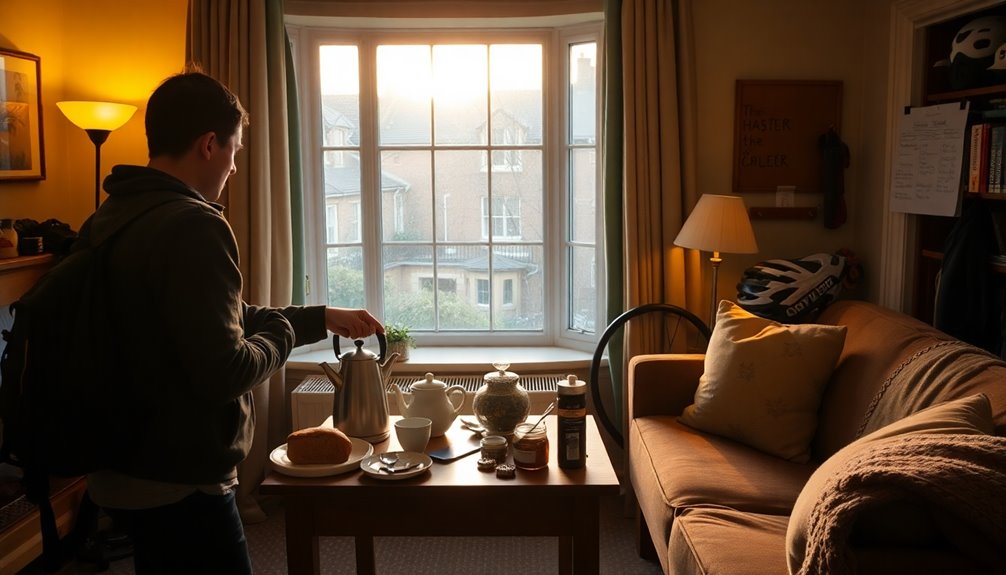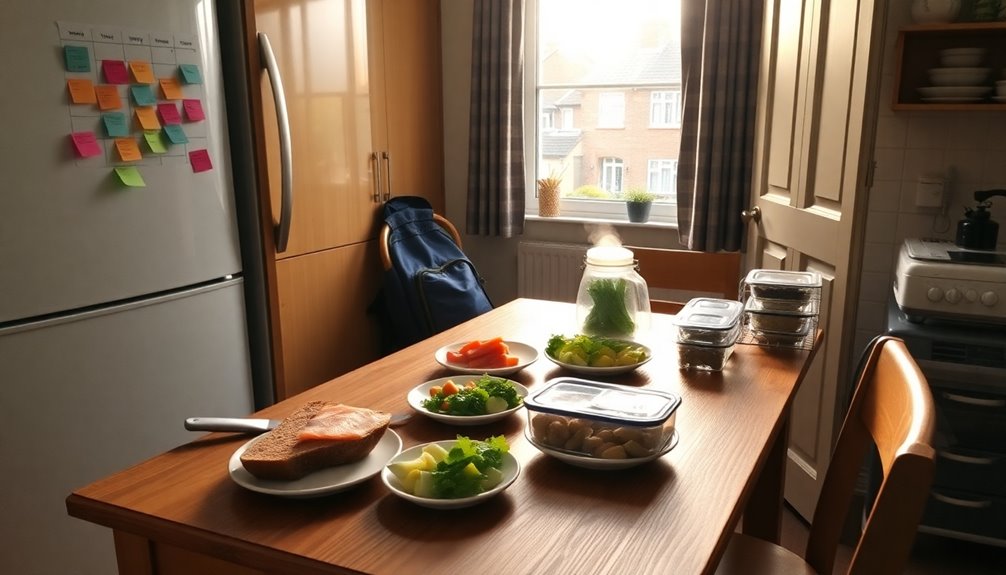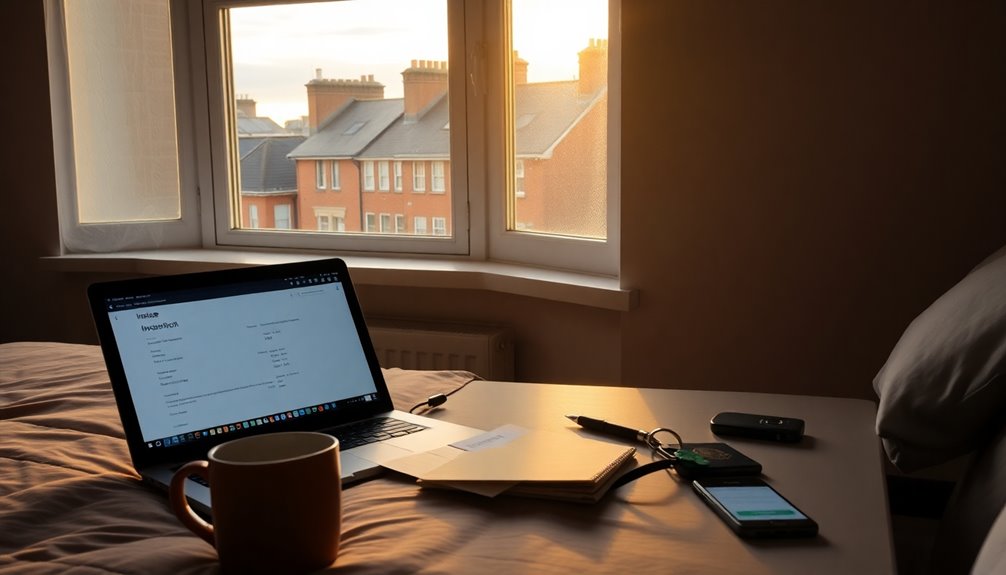
Pick a safe, well-connected Dublin neighborhood so you can walk or hop on a tram easily, and pack waterproof layers and compact dorm essentials. Set clear, fair house rules from day one and keep communication open with hosts and flatmates. Plan groceries, batch-cook, and label food to avoid awkwardness. Get a simple written tenancy, receipts for deposits and rent, and agree who pays utilities. Follow these basics and you’ll be ready to settle in — keep going to learn practical details.
Highlights
- Choose a safe, well-connected neighborhood near tram/bus stops, groceries, and study-friendly cafés.
- Agree written house rules and a simple tenancy sheet covering rent, deposit, guest policies, and cleaning.
- Communicate openly with hosts: set expectations, ask questions, and use a shared message thread for quick issues.
- Pack layerable clothing, a waterproof jacket, chargers, earplugs, and compact dorm essentials for Irish weather and shared living.
- Set clear payment methods and schedules, get receipts, and document maintenance requests for tenancy protections.
Choosing a Safe and Convenient Neighborhood
Where do you want to live in Dublin — somewhere lively and central or a quieter suburb with easy transit to campus? You’ll want to pick areas with safe neighborhoods where you can explore at night and leave your bike accessible without worry. Think about proximity to tram or bus stops so you’re not tethered to schedules; easy transit equals more spontaneous plans. Look for convenient amenities like grocery stores, laundrettes, cafes, and study-friendly spots within walking distance so daily life stays simple. Balance independence with practical needs: check lighting, local foot traffic, and online community groups to get honest opinions. Ultimately choose a place that lets you move freely, study effectively, and enjoy city life on your terms.
Communicating House Rules Clearly From Day One
When you move in, make house rules clear from day one so expectations don’t get fuzzy later; a short, friendly walkthrough and a printed or digital sheet covering essentials — quiet hours, guest policies, cleaning rotation, kitchen use, and emergency contacts — will save misunderstandings. You’ll want freedom, but clear boundaries keep it enjoyable for everyone. Use direct communication strategies: a quick meeting, a shared message thread, and a visible note in the common area. Invite questions, agree on reasonable flexibility, and set review points (weekly or monthly) so things can change with consent. Keep rules minimal, specific, and fair — nobody likes vague lists. Good house rules done with respectful communication strategies protect your independence and communal harmony.
Packing Essentials for Irish Weather and Dorm Life
Now that you’ve set house rules and agreed how things’ll run, it’s time to think about what to bring so you’re ready for Irish weather and dorm life. You’ll want practical gear that supports spontaneity: layerable, weather appropriate clothing that keeps you dry and warm without weighing you down, plus compact dorm room essentials that make your space functional and personal. Pack versatile shoes, a lightweight waterproof jacket, and quick-dry layers. Keep chargers, a power strip, and earplugs for shared walls. Aim for freedom to explore, not excess.
- A packable waterproof jacket, warm knit and breathable base layers
- Multi-use dorm room essentials: lamp, bedding set, small storage boxes
- Comfortable waterproof shoes and a compact umbrella
Managing Meals and Grocery Routines Efficiently

How will you keep meals simple, affordable, and stress-free while sharing kitchen space? You’ll rely on meal planning and clear kitchen organization to stay independent: map weekly menus, batch-cook time saving meals, label your containers and claim a shelf. Use cooking tips like one-pot recipes and frozen veg to cut prep time. Set a grocery budgeting routine—shop local markets for fresh produce and cheaper staples, compare prices, and buy versatile ingredients. Respect dietary preferences by communicating needs and prepping solo batches when required. Keep snack ideas handy (nuts, fruit, yogurt) for quick energy between classes. Stay flexible: rotate recipes, split bulk items with flatmates if convenient, and keep routines light so you can explore Dublin.
Building Respectful Relationships With Hosts and Housemates
Start by making sure you understand the house rules so expectations about noise, guests, and chores are clear. Be open and curious about cultural differences, and ask questions rather than assuming things. Respect shared spaces by cleaning up after yourself and agreeing on routines with your hosts and housemates.
Clear House Rule Understanding
Although living with a host family can feel informal, you should quickly clarify house rules so everyone knows what’s expected; simple conversations about quiet hours, kitchen use, visitors, and laundry prevent misunderstandings and show respect for shared space. You’ll want to set clear expectations early — that gives you freedom to plan nights out, study time, and guests without awkwardness. Ask how noises, cooking times, and cleaning are handled, and tell them how you like to live. Agreeing on basics helps you enjoy independence while respecting others.
- Confirm quiet hours and guest policies so your social life fits the household.
- Clarify kitchen sharing, food labels, and cleanup routines.
- Set laundry times and expectations to avoid conflicts.
Respect Cultural Differences
When you move in with a host family, you’ll notice habits and routines that might feel unfamiliar — and that’s a chance to learn, not judge. Embrace cultural sensitivity by observing before reacting; small customs—meal times, greetings, noise levels—tell you how things work. You’re free to keep your identity, but adapting shows respect and opens doors to deeper connection. Ask polite questions about traditions and share your own without insisting others follow them. Watch different communication styles: some hosts are direct, others more reserved, so match tone and pace to avoid misunderstandings. If something bothers you, bring it up calmly and privately. Building trust this way makes your stay smoother and more rewarding for everyone.
Shared Space Etiquette
Respecting cultural differences naturally extends to how you share rooms, bathrooms, kitchens and living areas with your hosts and housemates. You’ll want to be clear about cleaning responsibilities, agree on schedules, and keep common areas tidy so everyone feels free in their own space. Be upfront about guests, cooking times, and personal boundaries; that honesty prevents tension and preserves your independence.
- Ask about preferred cleaning routines and follow them consistently.
- Keep noise considerations in mind: quiet hours, music levels, and late-night arrivals.
- Share supplies, communicate when plans change, and offer help when needed.
You’ll build respect by being reliable, considerate, and open to feedback — that balance keeps your homestay comfortable and liberating.
Navigating Public Transport and Local Amenities
If you’re living with a Dublin homestay, getting around and finding everyday essentials is easier than you might expect: the city’s buses, trams (Luas), and trains (DART) link most neighbourhoods, while local shops, pharmacies, and cafés are usually a short walk away. Use these public transport tips: get a Leap Card, check peak times, and try real-time apps so you can plan freedom-filled days. Ask your host about nearby local amenities and the fastest routes to campus or nightlife. Below is a quick, relatable cheat-sheet to help you explore confidently.
| Mode | Cost tip | Best use |
|---|---|---|
| Bus | Leap Card saves | Short cross-city trips |
| Luas | Check line map | Quick central routes |
| DART | Off-peak deals | Coastal escapes |
Handling Payments, Deposits, and Housing Paperwork

When you’re agreeing to a homestay, make sure the rent and deposit terms are clear — including length of stay, what’s refundable, and any notice required. Check which payment methods the host accepts (bank transfer, card, cash) and get receipts for every transaction. Before you move in, review the lease or agreement carefully, ask for translations of any unclear clauses, and keep copies of all paperwork.
Rent and Deposit Terms
Because you’ll be handling money and paperwork from day one, it’s important to understand the rent schedule, deposit rules, and the documents landlords or host families will ask for. You want flexibility, so check if rent is weekly or monthly, when it’s due, and whether there’s room for rent negotiation if you plan a longer stay. Confirm the deposit amount, conditions for a deposit refund, and any deductions for damage. Get everything written.
- Ask for a simple written tenancy agreement outlining dates, rent, deposit terms, and house rules.
- Request a signed receipt for the deposit and each rent payment so you’re protected.
- Take dated photos of the room on move-in to support a full deposit refund later.
Payment Methods Accepted
Most host families and landlords accept a few standard payment methods, so check what’s preferred before you commit: bank transfer, standing order, cash, or online platforms like Revolut, Wise, or PayPal. You’ll want clarity on when rent is due, whether deposits are refundable, and if receipts are provided. Use digital payments where possible for traceable records and fast transfers, but confirm any cash options if that’s more convenient for you. Ask about splitting payments, lump-sum deposits, or automated standing orders to keep control of your budget. Get payment details in writing and save confirmations. If something feels restrictive or unclear, negotiate terms that match your need for flexibility and protect you financially while you enjoy Dublin.
Lease and Paperwork Tips
After sorting payment methods and schedules, you’ll want to get everything on paper so there’s no confusion later. Treat the lease as a roadmap: check notice periods, deposit return conditions, and whether bills are included. During lease negotiation, be clear about weekly rent, who pays utilities, and any house rules that limit your independence. Keep digital and physical copies; strong document organization lets you prove agreements quickly.
- Confirm deposit amount, payment deadlines, and refund conditions.
- Note agreed maintenance responsibilities and how to report issues.
- Save emails, receipts, and a signed lease in one accessible folder.
You deserve freedom and clarity — a tidy contract and organized paperwork protect your rights and let you focus on life in Dublin.
Some Questions Answered
Are Hosts Allowed to Provide Official Letters for Visa or Enrollment Purposes?
Yes — you can often get visa support letters from hosts, but they’ll only issue documents reflecting host responsibilities like accommodation confirmation; you shouldn’t rely solely on them for official enrollment or immigration approvals, so double‑check requirements.
Can I Have Visitors or Overnight Guests in a Homestay?
Yes — you can usually have visitors, but about 60% of hosts limit overnight stays. Check guest policies and confirm overnight arrangements beforehand; you’ll want flexibility, so pick hosts who respect your freedom and agree clear guidelines.
What Privacy Can I Expect in My Homestay Bedroom and Bathroom?
You’ll get a private bedroom with basic bedroom etiquette respected; bathrooms may be shared with scheduled bathroom access, so you’ll negotiate quiet times and lockable doors where possible, balancing your freedom with household routines and respect.
Are Utilities (Electricity, Heating, Internet) Included in Rent?
Often yes — but check your utilities breakdown and rental agreements. Freedom-seeking students should clarify what’s covered (electricity, heating, internet), negotiate flexible terms, and confirm usage limits or extra fees before moving in.
What Happens if I Need to Break My Homestay Agreement Early?
You can usually end early by giving the required termination notice; check your contract for notice length. You’ll want to confirm the refund policy—some hosts keep part of rent, others prorate or require replacement tenants, so stay flexible.
Summing Everything Up
Think of your Dublin homestay as a well-tuned clock: each careful choice — neighborhood, rules, packing, meals, respect, travel, payments — is a cog that keeps your days running smoothly. Tend those gears with honesty and curiosity, and they’ll turn into bridges: to safety, friendship, and learning. You’ll arrive as a visitor and leave carrying the city’s rhythm in your pocket — a small, reliable compass for wherever you go next.

https://shorturl.fm/QBEe2
https://shorturl.fm/e1Pas
https://shorturl.fm/KtsZh
https://shorturl.fm/zjstj
https://shorturl.fm/GNhR8
https://shorturl.fm/eLXVh
https://shorturl.fm/NyDO6
https://shorturl.fm/UNInU